Diogenes and Alexander
Diogenes and Alexander 翻译
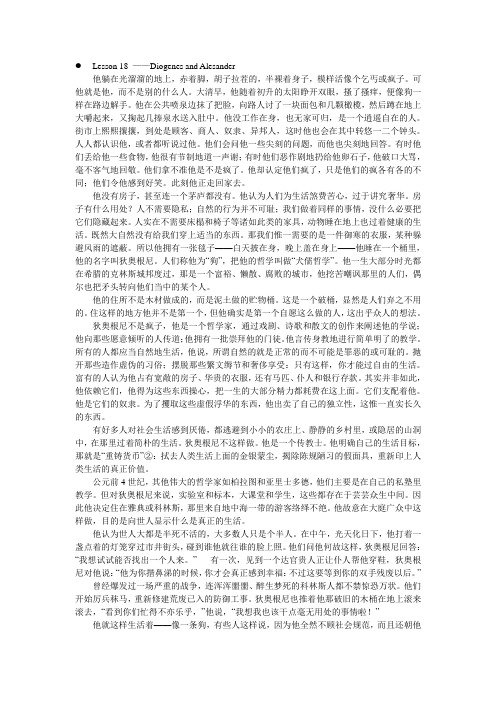
Lesson 18 ——Diogenes and Alesander他躺在光溜溜的地上,赤着脚,胡子拉茬的,半裸着身子,模样活像个乞丐或疯子。
可他就是他,而不是别的什么人。
大清早,他随着初升的太阳睁开双眼,搔了搔痒,便像狗一样在路边解手。
他在公共喷泉边抹了把脸,向路人讨了一块面包和几颗橄榄,然后蹲在地上大嚼起来,又掬起几捧泉水送入肚中。
他没工作在身,也无家可归,是一个逍遥自在的人。
街市上熙熙攘攘,到处是顾客、商人、奴隶、异邦人,这时他也会在其中转悠一二个钟头。
人人都认识他,或者都听说过他。
他们会问他一些尖刻的问题,而他也尖刻地回答。
有时他们丢给他一些食物,他很有节制地道一声谢;有时他们恶作剧地扔给他卵石子,他破口大骂,毫不客气地回敬。
他们拿不准他是不是疯了。
他却认定他们疯了,只是他们的疯各有各的不同;他们令他感到好笑。
此刻他正走回家去。
他没有房子,甚至连一个茅庐都没有。
他认为人们为生活煞费苦心,过于讲究奢华。
房子有什么用处?人不需要隐私;自然的行为并不可耻;我们做着同样的事情,没什么必要把它们隐藏起来。
人实在不需要床榻和椅子等诸如此类的家具,动物睡在地上也过着健康的生活。
既然大自然没有给我们穿上适当的东西。
那我们惟一需要的是一件御寒的衣服,某种躲避风雨的遮蔽。
所以他拥有一张毯子——白天披在身,晚上盖在身上——他睡在一个桶里,他的名字叫狄奥根尼。
人们称他为“狗”,把他的哲学叫做“犬儒哲学”。
他一生大部分时光都在希腊的克林斯城邦度过,那是一个富裕、懒散、腐败的城市,他挖苦嘲讽那里的人们,偶尔也把矛头转向他们当中的某个人。
他的住所不是木材做成的,而是泥土做的贮物桶。
这是一个破桶,显然是人们弃之不用的。
住这样的地方他并不是第一个,但他确实是第一个自愿这么做的人,这出乎众人的想法。
狄奥根尼不是疯子,他是一个哲学家,通过戏剧、诗歌和散文的创作来阐述他的学说;他向那些愿意倾听的人传道;他拥有一批崇拜他的门徒。
diogenes and alexander 课文翻译

diogenes and alexander 课文翻译“Diogenes and Alexander” is a famous story about the ancient Greek philosopher Diogenes andthe Macedonian king Alexander. The story has been repeated since antiquity and is believed to have originated in the writings of Plutarch, although some scholars suggest that it could have originated in the works of Aesop or Xenophon.The story goes as follows: One day, Alexander the Great went to visit the renowned philosopher Diogenes of Sinope and found him resting in the sunlight. Alexander asked if there was any favor he could do for Diogenes, to which the philosopher replied, “Yes, stand out of my light.”Alexander was so impressed with this reply that he said, “If I were not Alexander, I would be Diogenes.” To which Diogenes replied, “If I were not Diogenes, I would still be Diogenes.”This story has become a popular parable in Western culture because of its depiction of the two figures. It shows how Alexander, who was known for his power and ambition, humbled himself in front of the philosopher and admired his wisdom and wit. On the other hand, it also shows how Diogenes, despite his simplicity and lack of material possessions, was still content with the life he had chosen for himself.In this way, the story serves as an example of the importance of living a life of virtue and moderation over one of wealth and power. It reminds us that our character and wisdom are more important than what we own or how much power we possess.In Chinese culture, the story of Diogenes and Alexander is often used as an allegory toillustrate the contrast between the Confucian ideal of cultivating one's character, and the Daoistideal of living in harmony with nature. This interpretation ties in with the traditional Chinese view that morality comes from self-cultivation and not from external rewards or punishments.In summation, the story of Diogenes and Alexander is a timeless classic that can be interpreted in many different ways. Its lessons of humility and moderation are valuable for people of all ages and cultures, and can help us remember to focus on the things that truly matter in life.。
10-Unit-4-Diogenes-and-Alexander-教案讲义

Unit 4一、授课时间:第8、9周二.授课类型:理论课9课时;实践课3课时三.授课题目:Diogenes and Alexander四.授课时数:12五.教学目的和要求:通过讲授课文使大学生了解有关犬儒哲学的有关知识,学会用英语解释句子以达到学以致用的目的。
要求学生主动地预习课文,课前准备练习,学会分析文章体裁和进行段落划分。
六.教学重点和难点:1)背景知识的传授:Diogenes and Cynicism (doggishness);2)文章的体裁分析及段落划分;3)语言点的理解:Word study: account; possess; form; roll; elaborateGrammar Focus: The function of adverbial modifier in different sentences; Patterns: the first/second, ect./the next/last+to-infinitive; the first, ect. + who/that clause七.教学基本内容和纲要Part One Warm – up1.1 Warm-up Questions1.2 Define the following words and phrasesPart Two Background Information2.1 Differences and similarities between Diogenes and AlexanderPart Three Text Appreciation3.1 Text Analysis3.1.1 Theme of the text3.1.2 Structure of the text3.2 Writing Devices3.2.1 Contrast3.2.2 Developing paragraphs by examples3.2.3 Other ways of developing paragraphs?3.3 Sentence ParaphrasePart Four Language Study4.1 Phrases and Expressions4.1.1 Word list:4.1.2 Phrases and expressions list:4.1.3 Word Building4.2 Grammar4.2.1 ObjectPart Five Extension5.1 Group discussion八、教学方法和措施本单元将运用黑板、粉笔、多媒体网络辅助教学设备等教学手段,主要采用以学生为主体、教师为主导的任务型、合作型等教学模式,具体运用教师讲授法、师生讨论、生生讨论等方法进行教学。
10-Unit-4-Diogenes-and-Alexander-教案讲义
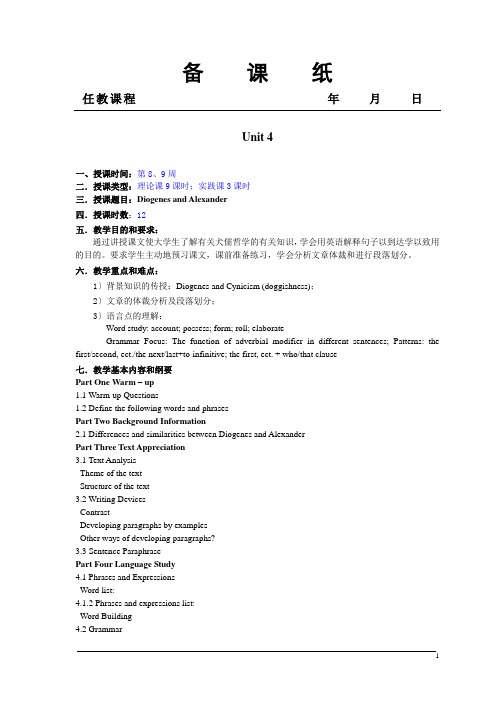
任教课程年月日Unit 4一、授课时间:第8、9周二.授课类型:理论课9课时;实践课3课时三.授课题目:Diogenes and Alexander四.授课时数:12五.教学目的和要求:通过讲授课文使大学生了解有关犬儒哲学的有关知识,学会用英语解释句子以到达学以致用的目的。
要求学生主动地预习课文,课前准备练习,学会分析文章体裁和进行段落划分。
六.教学重点和难点:1〕背景知识的传授:Diogenes and Cynicism (doggishness);2〕文章的体裁分析及段落划分;3〕语言点的理解:Word study: account; possess; form; roll; elaborateGrammar Focus: The function of adverbial modifier in different sentences; Patterns: the first/second, ect./the next/last+to-infinitive; the first, ect. + who/that clause七.教学基本内容和纲要Part One Warm – up1.1 Warm-up Questions1.2 Define the following words and phrasesPart Two Background Information2.1 Differences and similarities between Diogenes and AlexanderPart Three Text Appreciation3.1 Text AnalysisTheme of the textStructure of the text3.2 Writing DevicesContrastDeveloping paragraphs by examplesOther ways of developing paragraphs?3.3 Sentence ParaphrasePart Four Language Study4.1 Phrases and ExpressionsWord list:4.1.2 Phrases and expressions list:Word Building4.2 Grammar任教课程年月日ObjectPart Five Extension5.1 Group discussion八、教学方法和措施本单元将运用黑板、粉笔、多媒体网络辅助教学设备等教学手段,主要采用以学生为主体、教师为主导的任务型、合作型等教学模式,具体运用教师讲授法、师生讨论、生生讨论等方法进行教学。
DiogenesandAlexander翻译
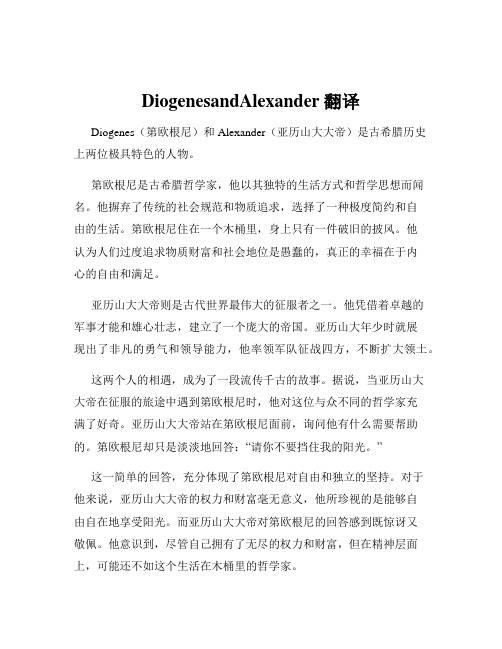
DiogenesandAlexander翻译Diogenes(第欧根尼)和 Alexander(亚历山大大帝)是古希腊历史上两位极具特色的人物。
第欧根尼是古希腊哲学家,他以其独特的生活方式和哲学思想而闻名。
他摒弃了传统的社会规范和物质追求,选择了一种极度简约和自由的生活。
第欧根尼住在一个木桶里,身上只有一件破旧的披风。
他认为人们过度追求物质财富和社会地位是愚蠢的,真正的幸福在于内心的自由和满足。
亚历山大大帝则是古代世界最伟大的征服者之一。
他凭借着卓越的军事才能和雄心壮志,建立了一个庞大的帝国。
亚历山大年少时就展现出了非凡的勇气和领导能力,他率领军队征战四方,不断扩大领土。
这两个人的相遇,成为了一段流传千古的故事。
据说,当亚历山大大帝在征服的旅途中遇到第欧根尼时,他对这位与众不同的哲学家充满了好奇。
亚历山大大帝站在第欧根尼面前,询问他有什么需要帮助的。
第欧根尼却只是淡淡地回答:“请你不要挡住我的阳光。
”这一简单的回答,充分体现了第欧根尼对自由和独立的坚持。
对于他来说,亚历山大大帝的权力和财富毫无意义,他所珍视的是能够自由自在地享受阳光。
而亚历山大大帝对第欧根尼的回答感到既惊讶又敬佩。
他意识到,尽管自己拥有了无尽的权力和财富,但在精神层面上,可能还不如这个生活在木桶里的哲学家。
第欧根尼的哲学思想对后世产生了深远的影响。
他的简约生活理念提醒着人们,不要被物质的欲望所迷惑,要追求内心的平静和真实的自我。
在当今社会,人们常常为了追求物质上的享受而忙碌奔波,忽略了内心的需求。
第欧根尼的故事让我们反思,是否我们所追求的东西真的能给我们带来幸福。
亚历山大大帝的征服之旅虽然充满了辉煌和成就,但也带来了战争的破坏和人民的苦难。
然而,从另一个角度来看,他的征服也促进了不同文化之间的交流与融合。
亚历山大大帝的帝国涵盖了众多不同的民族和文化,这种多元性在一定程度上推动了文明的发展。
第欧根尼和亚历山大大帝的对比,让我们看到了两种截然不同的价值观和生活方式。
大学英语(四)Diogenes_and_Alexander__戴奥吉尼斯和亚历山大
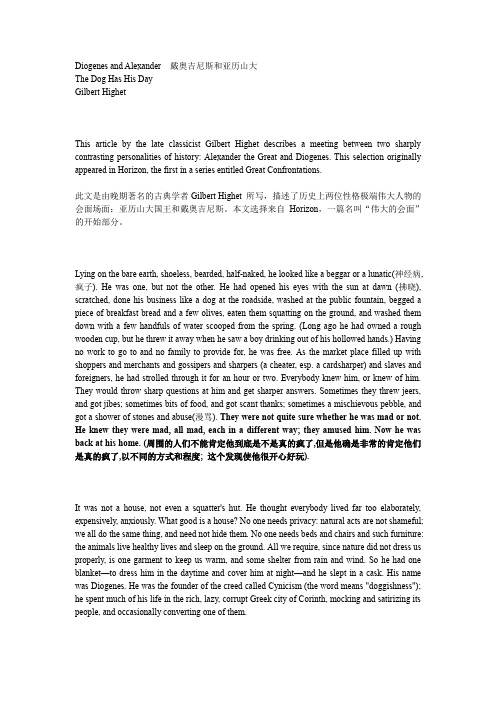
Diogenes and Alexander 戴奥吉尼斯和亚历山大The Dog Has His DayGilbert HighetThis article by the late classicist Gilbert Highet describes a meeting between two sharply contrasting personalities of history: Alexander the Great and Diogenes. This selection originally appeared in Horizon, the first in a series entitled Great Confrontations.此文是由晚期著名的古典学者Gilbert Highet 所写,描述了历史上两位性格极端伟大人物的会面场面:亚历山大国王和戴奥吉尼斯。
本文选择来自Horizon,一篇名叫“伟大的会面”的开始部分。
Lying on the bare earth, shoeless, bearded, half-naked, he looked like a beggar or a lunatic(神经病,疯子). He was one, but not the other. He had opened his eyes with the sun at dawn (拂晓), scratched, done his business like a dog at the roadside, washed at the public fountain, begged a piece of breakfast bread and a few olives, eaten them squatting on the ground, and washed them down with a few handfuls of water scooped from the spring. (Long ago he had owned a rough wooden cup, but he threw it away when he saw a boy drinking out of his hollowed hands.) Having no work to go to and no family to provide for, he was free. As the market place filled up with shoppers and merchants and gossipers and sharpers (a cheater, esp. a cardsharper) and slaves and foreigners, he had strolled through it for an hour or two. Everybody knew him, or knew of him. They would throw sharp questions at him and get sharper answers. Sometimes they threw jeers, and got jibes; sometimes bits of food, and got scant thanks; sometimes a mischievous pebble, and got a shower of stones and abuse(漫骂). They were not quite sure whether he was mad or not. He knew they were mad, all mad, each in a different way; they amused him. Now he was back at his home. (周围的人们不能肯定他到底是不是真的疯了,但是他确是非常的肯定他们是真的疯了,以不同的方式和程度; 这个发现使他很开心好玩).It was not a house, not even a squatter's hut. He thought everybody lived far too elaborately, expensively, anxiously. What good is a house? No one needs privacy: natural acts are not shameful; we all do the same thing, and need not hide them. No one needs beds and chairs and such furniture: the animals live healthy lives and sleep on the ground. All we require, since nature did not dress us properly, is one garment to keep us warm, and some shelter from rain and wind. So he had one blanket—to dress him in the daytime and cover him at night—and he slept in a cask. His name was Diogenes. He was the founder of the creed called Cynicism (the word means "doggishness"); he spent much of his life in the rich, lazy, corrupt Greek city of Corinth, mocking and satirizing its people, and occasionally converting one of them.His home was not a barrel made of wood: too expensive. It was a storage jar made of earthenware, something like a modern fuel tank—no doubt discarded because a break had made it useless. He was not the first to inhabit such a thing: the refugees driven into Athens by the Spartan invasion had been forced to sleep in casks. But he was the first who ever did so by choice, out of principle.Diogenes was not a degenerate or a maniac(疯子). He was a philosopher who wrote plays and poems and essays expounding(解释) his doctrine; he talked to those who cared to listen; he had pupils who admired him. But he taught chiefly by example. All should live naturally, he said, for what is natural is normal and cannot possibly be evil or shameful. Live without conventions, which are artificial and false; escape complexities and superfluities and extravagances: only so can you live a free life. The rich man believes he possesses his big house with its many rooms and its elaborate furniture, his pictures and expensive clothes, his horses and his servants and his bank accounts. He does not. He is their slave. In order to procure a quantity of false, perishable goods he has sold the only true, lasting good, his own independence. (富人们都相信, 拥有了属于自己的豪华大房子,房间很多,装饰和家具都很精致和气派, 还有很多的名画和很昂贵的衣服, 马匹和佣人,还有银行账户上的很多的钱。
Diogenes and Alexander 翻译

Lesson 18 ——Diogenes and Alesander他躺在光溜溜的地上,赤着脚,胡子拉茬的,半裸着身子,模样活像个乞丐或疯子。
可他就是他,而不是别的什么人。
大清早,他随着初升的太阳睁开双眼,搔了搔痒,便像狗一样在路边解手。
他在公共喷泉边抹了把脸,向路人讨了一块面包和几颗橄榄,然后蹲在地上大嚼起来,又掬起几捧泉水送入肚中。
他没工作在身,也无家可归,是一个逍遥自在的人。
街市上熙熙攘攘,到处是顾客、商人、奴隶、异邦人,这时他也会在其中转悠一二个钟头。
人人都认识他,或者都听说过他。
他们会问他一些尖刻的问题,而他也尖刻地回答。
有时他们丢给他一些食物,他很有节制地道一声谢;有时他们恶作剧地扔给他卵石子,他破口大骂,毫不客气地回敬。
他们拿不准他是不是疯了。
他却认定他们疯了,只是他们的疯各有各的不同;他们令他感到好笑。
此刻他正走回家去。
他没有房子,甚至连一个茅庐都没有。
他认为人们为生活煞费苦心,过于讲究奢华。
房子有什么用处?人不需要隐私;自然的行为并不可耻;我们做着同样的事情,没什么必要把它们隐藏起来。
人实在不需要床榻和椅子等诸如此类的家具,动物睡在地上也过着健康的生活。
既然大自然没有给我们穿上适当的东西。
那我们惟一需要的是一件御寒的衣服,某种躲避风雨的遮蔽。
所以他拥有一张毯子——白天披在身,晚上盖在身上——他睡在一个桶里,他的名字叫狄奥根尼。
人们称他为“狗”,把他的哲学叫做“犬儒哲学”。
他一生大部分时光都在希腊的克林斯城邦度过,那是一个富裕、懒散、腐败的城市,他挖苦嘲讽那里的人们,偶尔也把矛头转向他们当中的某个人。
他的住所不是木材做成的,而是泥土做的贮物桶。
这是一个破桶,显然是人们弃之不用的。
住这样的地方他并不是第一个,但他确实是第一个自愿这么做的人,这出乎众人的想法。
狄奥根尼不是疯子,他是一个哲学家,通过戏剧、诗歌和散文的创作来阐述他的学说;他向那些愿意倾听的人传道;他拥有一批崇拜他的门徒。
现代大学英语-精读3-Diogenes-and-Alexander-原文
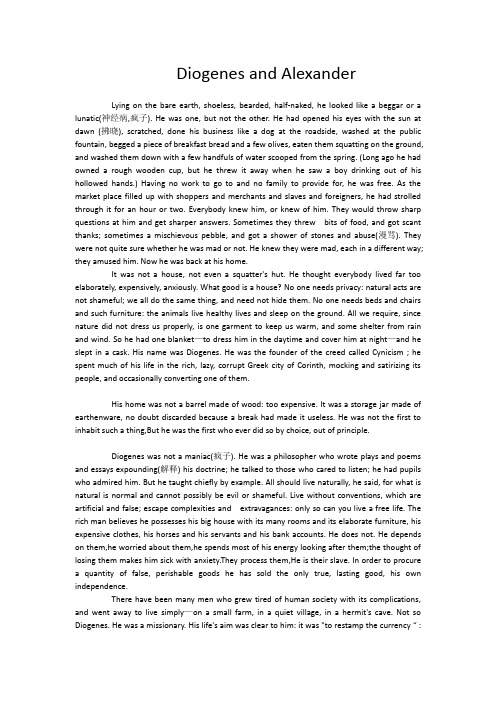
Diogenes and AlexanderLying on the bare earth, shoeless, bearded, half-naked, he looked like a beggar or a lunatic(神经病,疯子). He was one, but not the other. He had opened his eyes with the sun at dawn (拂晓), scratched, done his business like a dog at the roadside, washed at the public fountain, begged a piece of breakfast bread and a few olives, eaten them squatting on the ground, and washed them down with a few handfuls of water scooped from the spring. (Long ago he had owned a rough wooden cup, but he threw it away when he saw a boy drinking out of his hollowed hands.) Having no work to go to and no family to provide for, he was free. As the market place filled up with shoppers and merchants and slaves and foreigners, he had strolled through it for an hour or two. Everybody knew him, or knew of him. They would throw sharp questions at him and get sharper answers. Sometimes they threw bits of food, and got scant thanks; sometimes a mischievous pebble, and got a shower of stones and abuse(漫骂). They were not quite sure whether he was mad or not. He knew they were mad, each in a different way; they amused him. Now he was back at his home.It was not a house, not even a squatter's hut. He thought everybody lived far too elaborately, expensively, anxiously. What good is a house? No one needs privacy: natural acts are not shameful; we all do the same thing, and need not hide them. No one needs beds and chairs and such furniture: the animals live healthy lives and sleep on the ground. All we require, since nature did not dress us properly, is one garment to keep us warm, and some shelter from rain and wind. So he had one blanket—to dress him in the daytime and cover him at night—and he slept in a cask. His name was Diogenes. He was the founder of the creed called Cynicism ; he spent much of his life in the rich, lazy, corrupt Greek city of Corinth, mocking and satirizing its people, and occasionally converting one of them.His home was not a barrel made of wood: too expensive. It was a storage jar made of earthenware, no doubt discarded because a break had made it useless. He was not the first to inhabit such a thing,But he was the first who ever did so by choice, out of principle.Diogenes was not a maniac(疯子). He was a philosopher who wrote plays and poems and essays expounding(解释) his doctrine; he talked to those who cared to listen; he had pupils who admired him. But he taught chiefly by example. All should live naturally, he said, for what is natural is normal and cannot possibly be evil or shameful. Live without conventions, which are artificial and false; escape complexities and extravagances: only so can you live a free life. The rich man believes he possesses his big house with its many rooms and its elaborate furniture, his expensive clothes, his horses and his servants and his bank accounts. He does not. He depends on them,he worried about them,he spends most of his energy looking after them;the thought of losing them makes him sick with anxiety.They process them,He is their slave. In order to procure a quantity of false, perishable goods he has sold the only true, lasting good, his own independence.There have been many men who grew tired of human society with its complications, and went away to live simply—on a small farm, in a quiet village, in a hermit's cave. Not so Diogenes. He was a missionary. His life's aim was clear to him: it was "to restamp the currency “ :to take the clean metal of human life, to erase the old false conventional markings, and to imprint it with its true values.The other great philosophers of the fourth century BC,such as Plato and Aristotle, taught mainly their own private pupils.But for Diogenes, laboratory and specimens and lecture halls and pupils were all to be found in a crowd of ordinary people. Therefore, he chose to live in Athens or Corinth, where travelers from all over the Mediterranean world constantly came and went. And, by design, he publicly behaved in such ways as to show people what real life was.He thought most people were only half-alive, most men only half-men. At bright noonday he walked through the market place carrying a lighted lamp and inspecting the face of everyone he met. They asked him why. Diogenes answered, "I am trying to find a man."To a gentleman whose servant was putting on his shoes for him, Diogenes said, "You won't be really happy until he wipes your nose for you: that will come after you lose the use of your hands."Once there was a war scare so serious that it stirred even the lazy, profit-happy Corinthians. They began to drill, clean their weapons, and rebuild their neglected fortifications. Diogenes took his old cask and began to roll it up and down, back and forward. "When you are all so busy," he said, "I felt I ought to do something!"And so he lived—like a dog, some said, because he cared nothing for conventions of society, and because he showed his teeth and barked at those he disliked. Now he was lying in the sunlight, contented and happy, happier than the Shah of Persia. Although he knew he was going to have an important visitor, he would not move.The little square began to fill with people. Page boys , soldiers,secretaries, officers, diplomats, they all gradually formed a circle centered around Diogenes. He looked them over as a sober man looks at a crowd of tottering drunks, and shook his head. He knew who they were. They were the servants of Alexander, the conqueror of Greece, the Macedonian king, who was visiting his new realm.Only twenty, Alexander was far older and wiser than his years. Like all Macedonians he loved drinking, but he could usually handle it; and toward women he was nobly restrained and chivalrous. Like all Macedonians he loved fighting; he was a magnificent commander, but he was not merely a military automaton. He could think. At thirteen he had become a pupil of the greatest mind in Greece, Aristotle. who gave him the best of Greek culture. He taught Alexander poetry; the young prince slept with the Iliad under his pillow and longed to emulate Achilles, who brought the mighty power of Asia to ruin. He taught him philosophy, in particular the shapes and uses of political power and he taught him the principles of scientific research, and shipped hundreds of zoological specimens back to Greece for study. Indeed, it was from Aristotle that Alexander learned to seek out everything strange which might be instructive.Now, Alexander was in Corinth to take command of the League of Greek States which his father Philip created. He was welcomed and honored and flattered. He was the man of thehour, of the century; he was unanimously appointed commander-in-chief of a new expedition against old, rich, corrupt Asia. Nearly everyone crowded to Corinth in order to congratulate him, to seek employment with him.Only Diogenes, although he lived in Corinth, did not visit the new monarch. With that generosity which Aristotle had taught him, Alexander determined to call upon Diogenes.With his handsome face, his fiery glance, his strong supple body, his purple and gold cloak, and his air of destiny, he moved through the parting crowd, toward the Dog's kennel. When a king approaches, all rise in respect. Diogenes merely sat up on one elbow. When a monarch enters a place, all greet him with a bow or an acclamation. Diogenes said nothing.There was a silence. Alexander spoke first, with a kindly greeting. Looking at the poor broken cask, the single ragged garment, and the rough figure lying on the ground, he said, "Is there anything I can do for you, Diogenes?""Yes," said the Dog. "Stand to one side. You're blocking the sunlight."There was an amazed silence. Slowly, Alexander turned away. A titter broke out from the elegant Greeks. The Macedonian officers, after deciding that Diogenes was not worth the trouble of kicking, were starting to guffaw and nudge one another. Alexander was still silent. To those nearest him he said quietly, "If I were not Alexander, I should be Diogenes." They took it as a paradox.But Alexander meant it. He understood Cynicism as the others could not.He was what Diogenes called himself, a "citizen of the world." Like Diogenes, he admired the heroic figure of Hercules, who labored to help mankind while all others toiled and sweated only for themselves. He knew that of all men then alive in the world only Alexander the conqueror and Diogenes the beggar were free.。
Diogenes and Alexander 翻译

Diogenes and Alexander 翻译众所周知,古代希腊哲学家戴奥吉尼斯(Diogenes)和亚历山大大帝(Alexander the Great)之间的故事至今令人津津乐道。
这两位历史人物代表着两种截然不同的生活哲学和价值观。
本文将对双方进行比较,并探讨他们之间的冲突与共通之处。
戴奥吉尼斯是斯多亚学派的一位知名哲学家,他主张简朴和自由,追求真实的快乐和自足。
与之不同的是,亚历山大大帝则是一位伟大的军事统帅和征服者,他寻求权力和荣誉,追求辉煌的胜利。
据说,戴奥吉尼斯和亚历山大大帝在公元前4世纪曾有过一次非常有趣的碰面。
亚历山大大帝自称为世界君主,自诩为神的后裔。
他对自己的成就感到自豪,并迫切希望戴奥吉尼斯也承认他的卓越地位。
于是,在一次风和日丽的午后,亚历山大大帝找到了坐在街边的戴奥吉尼斯。
他向戴奥吉尼斯问好,并大声宣称:“戴奥吉尼斯,我是世界君主亚历山大!我拥有整个世界,我可以成为你的宝贝。
”然而,戴奥吉尼斯却毫不在意,慢悠悠地抬起头看着亚历山大大帝,然后轻描淡写地回答道:“抱歉,我现在正忙着看着我的专属太阳,你能稍后再来找我吗?”亚历山大大帝对戴奥吉尼斯的不屑一顾感到震惊,他无法理解这样一个平凡的人为何对他的伟大和荣耀如此漠不关心。
于是,亚历山大大帝压抑住内心的愤怒,耐心地问戴奥吉尼斯:“如果你不是忙于凝视太阳的话,你有什么要求吗?我可以满足你的愿望。
”戴奥吉尼斯幽默地回答道:“是的,如果你能站到一边,不挡住我的阳光,那我就满足了。
”这个寓言般的对话,精确地表达了戴奥吉尼斯的价值观。
他拒绝在亚历山大大帝面前低头,表达了对权力和军事胜利的淡薄态度。
相比之下,亚历山大大帝则展现了他的自尊心和对控制他人的渴望。
然而,尽管双方的价值观存在冲突,他们之间也有一些共通之处。
首先,二者都扮演了当时精神与行动的引领者的角色,无论是探索哲学真理还是征服世界,都在各自的领域内有着卓越的成就。
此外,戴奥吉尼斯和亚历山大大帝都是被后世仰慕的伟人,他们的故事激励着人们去思考和追寻更高的目标。
Diogenes and Alexander第奥真尼斯和亚历山大大帝
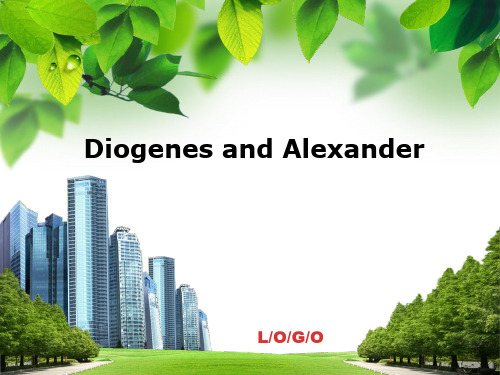
死因
Title in here
Text in here Text in here Text in here
2003
2004
2005
2006伤寒说来自中毒说 他认为除了自然的需要必须满足外,其他的任何 东西,包括社会生活和文化生活,都是不自然的、 无足轻重的。他强调禁欲主义的自我满足,鼓励 放弃舒适环境。 揭露大多数传统的标准和信条的虚伪性,号召人 们回复简朴自然的理想状态生活。 以身作则发扬“犬儒哲学”,试图颠覆一切传统 价值。他从不介意别人称呼他为“狗”,他甚至 高呼“像狗一样活着”。人们把他们的哲学叫做 A B C “犬儒主义”(Cynicism)。他的哲学思想为 古希腊崇尚简朴的生活理想奠定了基础。
Text in here Text in here
犬儒主义的发展
随着犬儒理念的流行,犬儒主义的内涵发生了微 妙的根本变化。早期的犬儒主义者是根据自身的 道德原则去蔑视世俗的观念;后期的犬儒主义者 依旧蔑视世俗的观念,但是却丧失了赖为准绳的 道德原则 早期的犬儒主义追求自然、本质,追求真理、美 德,蔑视世俗,愤世嫉俗,是一种理想主义;后 期的犬儒派玩世不恭、丧失道德,对人情世故十 分冷漠,对一切十分绝望 是一种虚无主义 犬儒一词的演变证明,从愤世嫉俗到玩世不恭, 其间只有一步之差。
犬儒主义
犬儒主义是一种带着厌倦情绪的负面态度,对于他人行为 的动机与诚信都采取一种不信任的态度。 源于古希腊犬儒学派学者主张的哲学思潮。该派别由苏格 拉底的学生安提西尼( Antisthenes)创立。本意是指 Text in here Text in here 人应当摒弃一切世俗的事物,包括宗教、礼节、惯常的衣 食住行方面的习俗等一切世俗。对身外之物一无所求,对 Text in here Text in hee 苦乐无动于衷。 其主要教条是,人要摆脱世俗的利益而追求唯一值得拥有 Text in here Text in here 的善. 倡导尽量少的改变自然,与自然和谐共处。不因人的过多 需求去改造自然,追求清静无为,小国寡民。
Diogenes-and-Alexander第奥真尼斯和亚历山大大帝(共18张)

Text in here Text in here
Text in here
Text in here
5 第5页,共18页。
CEO
Text in here
Text in here
Tet in here
Text inhere
Text in here
第6页,共18页。
主要 思想 (zhǔyào)
第13页,共18页。
Aristotle , Alexander III
❖ 亚历山大(yà lì shān dà)大帝是 亚里士多德的弟子,他是一 位智慧非凡的人
❖ 亚历山大童年早期就显示了 在音乐和马术上的才华,珍爱 荷马诗歌,亚里士多德给予他 完整的口才和文学训练,并 且激发了他对科学、医学和 哲学的兴趣。
第17页,共18页。
Thank You!
L/O/G/O
第18页,共18页。
观上促进了东西方的50文% 化交流。在希腊文化时代(亚历山大7%征服后的几百年间), 东方思想,15%特别是宗教思想就传入了希腊世界。3就5%是这种希腊文化──主要指具有 希腊特征但也深受东方影响的文化,最终对罗马产生了影响。
第15页,共18页。
Title in here
Text in here
2003
❖ 他认为除了自然的需要必须满足外,其他的任何东 西,包括社会生活和文化生活,都是不自然的、无 足轻重的。他强调禁欲主义的自我满足,鼓励放弃 舒适环境。
❖ 揭露大多数传统的标准和信条的虚伪性,号召人们 回复简朴自然的理想状态生活。
❖ 以身作则发扬“犬儒哲学”,试图颠覆一切传统价 值。他从不介意别人称呼他为“狗”,他甚至高呼
❖ 他还是亚里士多德的弟子,是一位智慧非凡的人,一般认为,亚历山大是位颇受人喜爱
Diogenes and Alexander 翻译

Lesson 18 ——Diogenes and Alesander他躺在光溜溜的地上,赤着脚,胡子拉茬的,半裸着身子,模样活像个乞丐或疯子。
可他就是他,而不是别的什么人。
大清早,他随着初升的太阳睁开双眼,搔了搔痒,便像狗一样在路边解手。
他在公共喷泉边抹了把脸,向路人讨了一块面包和几颗橄榄,然后蹲在地上大嚼起来,又掬起几捧泉水送入肚中。
他没工作在身,也无家可归,是一个逍遥自在的人。
街市上熙熙攘攘,到处是顾客、商人、奴隶、异邦人,这时他也会在其中转悠一二个钟头。
人人都认识他,或者都听说过他。
他们会问他一些尖刻的问题,而他也尖刻地回答。
有时他们丢给他一些食物,他很有节制地道一声谢;有时他们恶作剧地扔给他卵石子,他破口大骂,毫不客气地回敬。
他们拿不准他是不是疯了。
他却认定他们疯了,只是他们的疯各有各的不同;他们令他感到好笑。
此刻他正走回家去。
他没有房子,甚至连一个茅庐都没有。
他认为人们为生活煞费苦心,过于讲究奢华。
房子有什么用处?人不需要隐私;自然的行为并不可耻;我们做着同样的事情,没什么必要把它们隐藏起来。
人实在不需要床榻和椅子等诸如此类的家具,动物睡在地上也过着健康的生活。
既然大自然没有给我们穿上适当的东西。
那我们惟一需要的是一件御寒的衣服,某种躲避风雨的遮蔽。
所以他拥有一张毯子——白天披在身,晚上盖在身上——他睡在一个桶里,他的名字叫狄奥根尼。
人们称他为“狗”,把他的哲学叫做“犬儒哲学”。
他一生大部分时光都在希腊的克林斯城邦度过,那是一个富裕、懒散、腐败的城市,他挖苦嘲讽那里的人们,偶尔也把矛头转向他们当中的某个人。
他的住所不是木材做成的,而是泥土做的贮物桶。
这是一个破桶,显然是人们弃之不用的。
住这样的地方他并不是第一个,但他确实是第一个自愿这么做的人,这出乎众人的想法。
狄奥根尼不是疯子,他是一个哲学家,通过戏剧、诗歌和散文的创作来阐述他的学说;他向那些愿意倾听的人传道;他拥有一批崇拜他的门徒。
diogenes and alexander 文章赏析

diogenes and alexander 文章赏析一、介绍Diogenes和Alexander的背景及关系在古希腊历史中,Diogenes和Alexander两位人物极具代表性。
Diogenes,一位被誉为“智慧老人”的哲学家,他生活在公元前4th世纪,以崇尚自由、追求真理和智慧著称。
而Alexander,则是希腊帝国的奠基人,一位具有卓越军事才能和广泛影响力的统治者。
虽然他们生活在同一个时代,但两人的身份和追求有所不同,他们在一定程度上也反映了当时社会的矛盾和价值观的碰撞。
二、分析Diogenes作为智慧老人的象征及其对Alexander的影响Diogenes被誉为“智慧老人”,这不仅仅是因为他的年龄和智慧,更是因为他代表了当时一种追求自由、独立思考的精神。
他过着简朴的生活,倡导回归自然,反对束缚。
他的这种生活方式和思想观念对年轻的Alexander产生了深刻的影响。
在某种程度上,Alexander视Diogenes为自己的导师,从他那里寻求智慧和指导。
三、讨论Alexander对待Diogenes的态度及原因尽管Alexander是一位有着卓越才能的统治者,但他对待Diogenes的态度却十分尊敬。
这主要是因为Diogenes的智慧、品行和独立思考的精神深深地吸引了Alexander。
在他眼中,Diogenes是一个值得学习和景仰的典范。
此外,Alexander也认识到了Diogenes对他的统治和领导能力的启示,因此对他更加敬重。
四、分析Diogenes对Alexander的启示和影响Diogenes对Alexander的启示主要体现在三个方面:一是追求真理,这使Alexander在征战中始终保持着清醒的头脑,力求了解真实情况;二是崇尚自由,这使得Alexander在治理国家时,注重人民的自由和福祉;三是独立思考,这使得Alexander在面对困境时,能够作出明智的决策。
五、总结文章主题及启示本文通过对Diogenes和Alexander的描述,展示了两位截然不同的人物在某种程度上的共鸣。
DiogenesandAlexander奥真尼斯和亚历山大大帝PPT课件
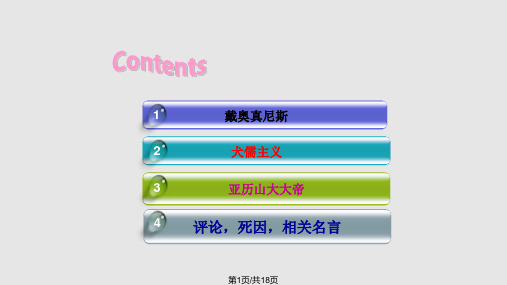
戴奥真尼斯
2
犬儒主义
3
亚历山大大帝
4 评论,死因,相关名言
第1页/共18页
Diogenes 戴奥真尼斯/第欧根尼
Diogenes(412324 BC) was a famous Greek philosopher ,one of the founder of the creed called Cynicism.
第13页/共18页
人物评论
• 亚历山大是历史上最富有戏剧性的人物,有关他生涯的确凿事实十分富有戏剧性,有
关他的名字就有许多种传说。作为战士,他智勇双全;作为将军,他无与伦比。在11年的奋战 中,他从未打过一次败仗;当时记载普遍相信亚历山大是天神宙斯之子,在亚历山大出世之前,
奥林匹娅斯梦见雷电,而派拉市区则有一座女神殿失火焚毁,附近人心惶惶,几个占卜师都说是
古代马其顿国王腓力 二世之子。
亚里士多德的学生之 一。
第10页/共18页
亚历山大大帝
20岁继承王位 13岁随父出征
建立帝国 建立帝国
33岁去世 33岁去世
第11页/共18页
著名的军事家和政治家
• 他足智多谋,智勇双全,在11年的奋战中,他从未打过一次败仗。 • 在担任马其顿国王的短短13年中,以其雄才大略。东征西讨,先是确立了在全希腊的统治地位,后又灭亡
第12页共18页aristotlealexanderiii亚历山大大帝是亚里士多德的弟子他是一位智慧非凡的人亚历山大童年早期就显示了在音乐和马术上的才华珍爱荷马诗歌亚里士多德给予他完整的口才和文学训练并且激发了他对科学医学和哲学的兴趣第13页共18页人物评论亚历山大是历史上最富有戏剧性的人物有关他生涯的确凿事实十分富有戏剧性有关他的名字就有许多种传说
Diogenes-and-Alexander-翻译
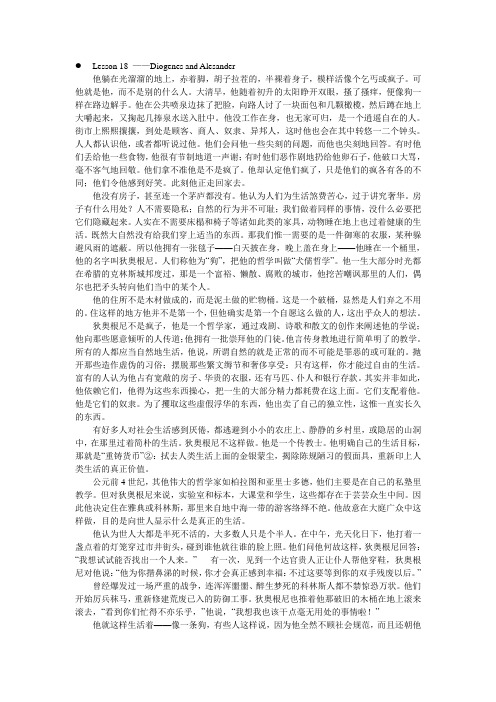
Lesson 18 ——Diogenes and Alesander他躺在光溜溜的地上,赤着脚,胡子拉茬的,半裸着身子,模样活像个乞丐或疯子。
可他就是他,而不是别的什么人。
大清早,他随着初升的太阳睁开双眼,搔了搔痒,便像狗一样在路边解手。
他在公共喷泉边抹了把脸,向路人讨了一块面包和几颗橄榄,然后蹲在地上大嚼起来,又掬起几捧泉水送入肚中。
他没工作在身,也无家可归,是一个逍遥自在的人。
街市上熙熙攘攘,到处是顾客、商人、奴隶、异邦人,这时他也会在其中转悠一二个钟头。
人人都认识他,或者都听说过他。
他们会问他一些尖刻的问题,而他也尖刻地回答。
有时他们丢给他一些食物,他很有节制地道一声谢;有时他们恶作剧地扔给他卵石子,他破口大骂,毫不客气地回敬。
他们拿不准他是不是疯了。
他却认定他们疯了,只是他们的疯各有各的不同;他们令他感到好笑。
此刻他正走回家去。
他没有房子,甚至连一个茅庐都没有。
他认为人们为生活煞费苦心,过于讲究奢华。
房子有什么用处?人不需要隐私;自然的行为并不可耻;我们做着同样的事情,没什么必要把它们隐藏起来。
人实在不需要床榻和椅子等诸如此类的家具,动物睡在地上也过着健康的生活。
既然大自然没有给我们穿上适当的东西。
那我们惟一需要的是一件御寒的衣服,某种躲避风雨的遮蔽。
所以他拥有一张毯子——白天披在身,晚上盖在身上——他睡在一个桶里,他的名字叫狄奥根尼。
人们称他为“狗”,把他的哲学叫做“犬儒哲学”。
他一生大部分时光都在希腊的克林斯城邦度过,那是一个富裕、懒散、腐败的城市,他挖苦嘲讽那里的人们,偶尔也把矛头转向他们当中的某个人。
他的住所不是木材做成的,而是泥土做的贮物桶。
这是一个破桶,显然是人们弃之不用的。
住这样的地方他并不是第一个,但他确实是第一个自愿这么做的人,这出乎众人的想法。
狄奥根尼不是疯子,他是一个哲学家,通过戏剧、诗歌和散文的创作来阐述他的学说;他向那些愿意倾听的人传道;他拥有一批崇拜他的门徒。
diogenes and alexander 文章赏析
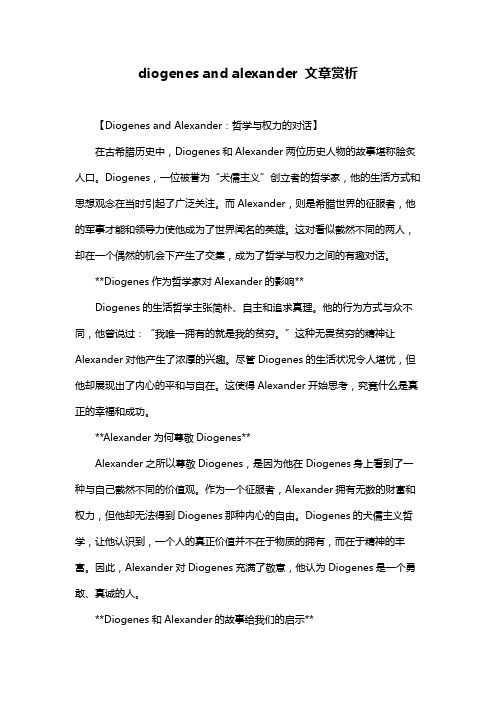
diogenes and alexander 文章赏析【Diogenes and Alexander:哲学与权力的对话】在古希腊历史中,Diogenes和Alexander两位历史人物的故事堪称脍炙人口。
Diogenes,一位被誉为“犬儒主义”创立者的哲学家,他的生活方式和思想观念在当时引起了广泛关注。
而Alexander,则是希腊世界的征服者,他的军事才能和领导力使他成为了世界闻名的英雄。
这对看似截然不同的两人,却在一个偶然的机会下产生了交集,成为了哲学与权力之间的有趣对话。
**Diogenes作为哲学家对Alexander的影响**Diogenes的生活哲学主张简朴、自主和追求真理。
他的行为方式与众不同,他曾说过:“我唯一拥有的就是我的贫穷。
”这种无畏贫穷的精神让Alexander对他产生了浓厚的兴趣。
尽管Diogenes的生活状况令人堪忧,但他却展现出了内心的平和与自在。
这使得Alexander开始思考,究竟什么是真正的幸福和成功。
**Alexander为何尊敬Diogenes**Alexander之所以尊敬Diogenes,是因为他在Diogenes身上看到了一种与自己截然不同的价值观。
作为一个征服者,Alexander拥有无数的财富和权力,但他却无法得到Diogenes那种内心的自由。
Diogenes的犬儒主义哲学,让他认识到,一个人的真正价值并不在于物质的拥有,而在于精神的丰富。
因此,Alexander对Diogenes充满了敬意,他认为Diogenes是一个勇敢、真诚的人。
**Diogenes和Alexander的故事给我们的启示**Diogenes与Alexander的故事,让我们思考了什么是真正的成功。
在现代社会,人们往往被物质诱惑所困扰,忽略了内心的追求。
而Diogenes的人生哲学,告诉我们,简朴、自主和追求真理的生活方式才是我们应该追求的。
同时,Alexander的尊敬Diogenes也提醒我们,无论身处何种地位,都应该保持谦逊,尊重他人的价值观。
diogenes and alexander 文章赏析

diogenes and alexander 文章赏析摘要:1.迪奥根尼斯与亚历山大故事的背景介绍2.迪奥根尼斯的人生哲学及其体现3.亚历山大与迪奥根尼斯的相遇及对话4.故事中所传达的人生哲理5.对现代人的启示正文:一、迪奥根尼斯与亚历山大故事的背景介绍迪奥根尼斯(Diogenes)是一位古希腊哲学家,他是犬儒学派(Cynic)的创立者,生活在公元前400年至公元前320年。
犬儒学派强调简朴、自制和自然的生活态度。
亚历山大(Alexander)则是古希腊的一位伟大征服者,他在公元前4世纪统一了希腊世界,并将其影响力扩展到亚洲和埃及等地。
二、迪奥根尼斯的人生哲学及其体现迪奥根尼斯主张人应当摆脱物质束缚,追求心灵的自由。
他认为,幸福并不取决于财富、地位等外在因素,而是取决于内心的智慧和觉悟。
为了体现这一观念,他选择过上简朴的生活,住在木桶里,穿着破烂的衣服,以乞讨为生。
他主张自给自足,不受世俗观念的约束,追求内心的自由与宁静。
三、亚历山大与迪奥根尼斯的相遇及对话有一次,亚历山大遇到迪奥根尼斯,他被迪奥根尼斯的生活态度所吸引,于是上前与他交谈。
亚历山大问迪奥根尼斯:“你有什么需要我帮助的吗?”迪奥根尼斯回答:“是的,请你让开,不要挡住我的阳光。
”这句回答令亚历山大深感敬佩,他认为迪奥根尼斯是一个勇敢、独立的人,尊敬地称他为“伟大的犬儒主义者”。
四、故事中所传达的人生哲理这个故事传达了以下人生哲理:1.内心自由比外在地位更重要;2.简朴生活有助于提升心灵的境界;3.勇敢面对困境,保持独立的人格;4.尊重他人,尤其是那些追求内心自由的人。
五、对现代人的启示迪奥根尼斯与亚历山大的故事给现代人带来以下启示:1.不要过分追求物质财富,重视心灵的成长;2.学会珍惜简单、平凡的生活;3.勇敢地追求自己的梦想,不受世俗观念的束缚;4.尊重他人的选择,包容不同的价值观。
通过这个故事,我们可以认识到,无论时代如何变迁,人生的本质需求并未改变。
Unit 4 Diogenes and Alexander 教案讲义

Unit 4一、授课时间:第8、9周二.授课类型:理论课9课时;实践课3课时三.授课题目:Diogenes and Alexander四.授课时数:12五.教学目的和要求:通过讲授课文使大学生了解有关犬儒哲学的有关知识,学会用英语解释句子以达到学以致用的目的。
要求学生主动地预习课文,课前准备练习,学会分析文章体裁和进行段落划分。
六.教学重点和难点:1)背景知识的传授:Diogenes and Cynicism (doggishness);2)文章的体裁分析及段落划分;3)语言点的理解:Word study: account; possess; form; roll; elaborateGrammar Focus: The function of adverbial modifier in different sentences; Patterns: the first/second, ect./the next/last+to-infinitive; the first, ect. + who/that clause七.教学基本内容和纲要Part One Warm – upWarm-up QuestionsDefine the following words and phrasesPart Two Background InformationDifferences and similarities between Diogenes and AlexanderPart Three Text AppreciationText Analysis3.1.1 Theme of the text3.1.2 Structure of the textWriting Devices3.2.1 Contrast3.2.2 Developing paragraphs by examples3.2.3 Other ways of developing paragraphsSentence ParaphrasePart Four Language StudyPhrases and Expressions4.1.1 Word list:4.1.2 Phrases and expressions list:4.1.3 Word BuildingGrammar4.2.1 ObjectPart Five ExtensionGroup discussion八、教学方法和措施本单元将运用黑板、粉笔、多媒体网络辅助教学设备等教学手段,主要采用以学生为主体、教师为主导的任务型、合作型等教学模式,具体运用教师讲授法、师生讨论、生生讨论等方法进行教学。
DiogenesandAlexander第奥真尼斯和亚历山大大帝(共18张PPT)

❖ 倡导尽量少T的ex改t in变he自re然,与自然和谐共处T。ext不in h因er人e 的过多需 求去改造自然,追求清静无为,小国寡民。
犬儒主义的发展
❖ 随着犬儒理念的流行,犬儒主义的内涵发生了微妙 的根本变化。早期的犬儒主义者是根据自身的道德 原则去蔑视世俗的观念;后期的犬儒主义者依旧蔑 视世俗的观念,但是却丧失了赖为准绳的道德原则
❖ He was born in Sinope(modern-day Sinope,Turkey)and died at Corinth科林斯(希腊古城)。
❖ His father was a banker.
General Introduction
❖It is said that Diogenes aided his father in the banking business,and he became embroiled in a scandal involving the adulteration or defacement of the currency,and Diogenes was exiled from the city.From then,he lived in streets of Corinth , Athens ;And he became the prototype of Cynicism.
文化,最终对罗马产生了影响。
死因
当时记载普遍相信亚历山大是天神宙斯之子,在亚历山大出世之前,奥林匹娅斯梦见雷电,而派拉市区则有一座女神殿失火焚毁,附近人心惶惶,
几个占卜师都说是大灾难来临的前兆,此时有一人却说:“女神殿的焚毁日,已有一个男孩在同日诞生,此儿以后将要灭亡全亚洲。
Text in here
- 1、下载文档前请自行甄别文档内容的完整性,平台不提供额外的编辑、内容补充、找答案等附加服务。
- 2、"仅部分预览"的文档,不可在线预览部分如存在完整性等问题,可反馈申请退款(可完整预览的文档不适用该条件!)。
- 3、如文档侵犯您的权益,请联系客服反馈,我们会尽快为您处理(人工客服工作时间:9:00-18:30)。
They would throw sharp questions and get sharper answers, throw food and get s____ cant thanks, even a m______ ischievous pebble and get a show of stones and abuse. They were not sure whether Diogenes was mad or not, but he knew they were mad. He thought everybody lived far too e_______ , expensively and anxiously and laborately no one needed privacy. So he decided to like in nature.
Having one b_____ to dress in the lanket daytime and cover at night and sleeping in a c___. He founded the ask c___ calБайду номын сангаасed Cynicism and spent much reed of his life in Greek city of Corinth, m____ , and s____ atirizing its people and ocking c_____ onverting one of them. He was a philosopher who wrote plays and poems and essays e_____ xpounding his d____ . He also had pupils. Only live octrine
him. Only Diogenes did not visit the new m____ . However, with onarch generosity which Aristotle taught him, he determined to call up Diogenes and offered to do something for him. But what Diogenes asked Alexander to do was to stand to one side because he was b____ the sunlight. locking Alexander turned away slowly and said “if I were not Alexander, I should
than his years. He loved drinking, but could handle it; he loved fighting, but not merely a military a_____ utomaton ; he was nobly r_____ hivalrous estrained and c_____ toward women. He was the pupil of Aristotle and longed to e_____ mulate Achilles. Now he was welcomed and honored and flattered. Everyone in Corinth crowed him to congratulate, seek employment with or simply see
and wiser be Diogenes”. They understood each other deeply and of all the men lived in the world, they were the only two who were truly free.
without c______ onventions , you can live a free life. He thought most people were half-alive, most men only halfmen. When Corinth was conquered, people were s____ . But he was lying tirred in the sunlight, contented, and happy, knowing an important visitor is coming. The visitor Alexander, the conqueror of Greece, was only twenty, but was far older
